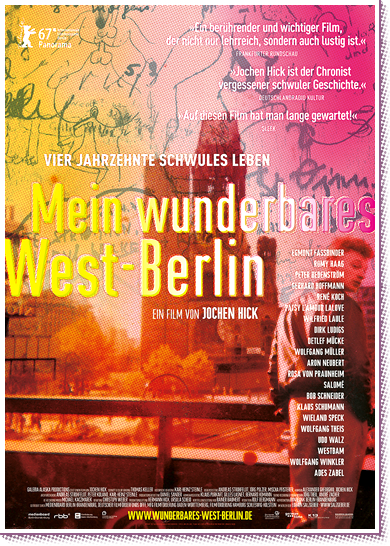Being gay in West Berlin
Background
After the end of the Nazi era and the Second World War, Germany lay in ruins. The social structures were equally broken, with the liberal advances and achievements of the Weimar Republic long buried. The historic endeavors of the scientific and humanitarian committees of Markus Hischfeld and other organizations to rid the country of the notoriously discriminatory paragraph §?175 in German law had long been forgotten. Shortly after Hitler's rise to power in 1933, the Nazis closed down most gay venues and in 1935, tightened laws criminalizing gays. Before this time "intercourse-like activities" between men were already prosecutable, yet now even the more ambiguous notion of "lusty arousal" between men became a criminal offense. The Nazis also introduced paragraph §?175a, which sent men to prison for up to 10 years in the case of a "severe sexual offense" (such as sex with a minor or prostitution). The pink triangle that homosexuals were forced to wear in the concentration camps became a symbol for the immeasurable suffering, stigma, and State-run terror that gays and lesbians were subjected to.
Secret Love: the 50's & 60's in the era of paragraph §?175
After the war, the Federal German lawmakers carried over paragraph §?175 unaltered, just as the Nazis had written it in its 1935 version.1
This was justified by the contention that the tightening of the law by the Nazis was not based on Nazi concepts. A parliamentary document from 1962 reads: "Where same-sex fornication abounds, the degeneration and moral decline of the populace follows." Within this legal framework, denunciation, raids, and summons2 were part of daily life for many homosexuals in West Germany. More than 50,000 men were convicted and served prison sentences under the provision of §?175 up until the 1960's. The efforts of some individuals to overturn the law through the dissemination of information and petitions to parliament, failed.

Gay West Berliners who grew up in the 50's and 60's knew that society not only disdained and condemned their sexual orientation, but also considered it criminal. However "this was not something one talked about", as Klaus Schumann, who grew up in Schöneberg's "red triangle" district, states. Behind his back, Klaus was called a "doll boy". At the time, he didn't know what it meant, but understood that it was not a good thing when he witnessed his parents throw a fit about the reference.
Meanwhile a gay subculture was beginning to flourish in Berlin, hidden away behind closed doors and ambiguous doorbell nameplates. Berlin and Hannover were the only cities in West Germany, where dancing between men was not prohibited. Dozens of gay bars actively reinforced Berlin's reputation as the most libertine and permissive city in the country, among them the Kleist Casino. René Koch, who worked there as a bartender, describes the extravagant interior as "ritzy, lavish, classy, and with chandeliers - it was all poofy baroque".
One of the most prominent venues was the Eldorado, where drag artists like Marcel André performed. West Berlin abounded with public restrooms and parks that were well-known meeting places for gay sex. This licentiousness attracted young gays from across the country to West Berlin - students, draft dodgers, and hedonists of all colors.
Time of revolt: the gay and lesbian movement of the 70's
While the US was engaged in the Vietnam war during the late 60's, left-wing student movements were gaining ground throughout the Western world; and with them, the desire for more sexual freedom. On New York's Christopher Street in 1969, gays, lesbians, and transsexuals publicly took a stand against police discrimination for the first time. In the same year, West Germany overturned §?175 during a reform of the penal code. Four years later, a further amendment decreased the age of consent from 21 to 18 years. A Spiegel magazine cover from the time reads: "Homosexuals: freed, but still ostracized".
During the Berlin film festival of 1971, Rosa von Praunheim´s film "It Is Not the Homosexual Who Is Perverse, But the Society in Which He Lives" (co-author: Martin Dannecker) stirred up immense controversy and division in the gay world. While some homosexuals vehemently rejected the film as defamatory, others euphorically hailed it. The film's message was: "Get out of the public toilets and into the streets!" Screenings of the film resulted in the formation of gay action groups in many German cities.
In Berlin, the group Homosexual Action West Berlin (HAW) was created. "We wanted a gay revolution to overcome capitalism side by side with the working class and to free gays", explains Wolfgang Theis, who was part of the group from its start. The HAW took part in leftist demonstrations, collected signatures for a reversal of §?175, and mobilized against occupational bans targeting gay teachers. For many of its members, the HAW became like a family. Some even went a step further and began living together in gay communes. The most important campaigns of the highly politicized group were filmed by the openly gay teacher Wilfried Laule with his Super-8 camera.

Since most of the HAW members were students, their political point of views were as colorful and diverse as the left wing of that decade was. In the early days, they created a close alliance with equally political and combative lesbians. Yet the women soon dissociated themselves from the domineering gays. Heated discussions arose in the gay community about what gays should be like. Should gays act like "real guys" or rather be provocatively poofy? The painter and artist Salomé remembers: "We created a "drag" faction. We would meet at the HAW and decide to do an action in the metro on the weekend. We'd tell everyone to come as dolled up as possible in order to be more visible." Yet this type of provocation was quite dangerous. "I can remember a few situations when we had to jump out of the metro in order to avoid getting beaten up."
Activists from the HAW left their marks on society, some of which are still at work today. Gerhard Hoffmann was the creator of the magazine Die Schwuchtel (literally: The Pansy) and also started the gay café Anderes Ufer on a main street in Schöneberg in 1977. "We opened the first homosexual bar that raised the blinds and allowed passers-by to look in", Hoffmann remembers. "It was modern, avantgarde, and open to everybody, with lots of art and events." David Bowie, who lived two houses down the street, was a regular. The publishing house Pink Triangle, created in 1975 and headed by Egmont Fassbinder for over 20 years, published both fiction and non-fiction books on gay topics. Peter Hedenström and some friends opened the gay bookstore Prinz Eisenherz, which still exists today. In the mid 80's, Berlin's Schwulen Museum* (gay museum) was also founded by HAW members and co-founder Wolfgang Theis still works there today. The HAW also brought forth the gay center SchwuZ, which has also remained a trendy gay club and meeting place to this day.
The gay subculture that director Rosa von Praunheim had critically mirrored in his 1971 film continued to thrive throughout the 70's, with the annual drag ball being the most important event of the year for the bourgeois gay world. In 1974, the 26-year old transsexual drag artist Romy Haag opened the legendary club Chez Romy Haag. "In the old West, there were no hierarchies or social classes. Everyone had to get along with everyone else", is how she describes the atmosphere that predominated in her club and the area. In the mid 70's, the gay leathermen scene opened Die Knolle, the first venue in Berlin with a darkroom. Berlin's gay scene was beginning to diversify.
New Lifestyles: the 80's
In the late 70's, Wolfgang Müller, founder of the punk band "Die Tödliche Doris", came to Berlin and took part in the first CSD rally in 1979. "West Berlin looked totally trashy and shoddy at the time. There were still all sorts of old former Nazis running around, who's views didn't fit into the culture of the West or the East, nor any other part of society." Partly due to the emergence of the SO36 club and the Oranienbar, the district of Kreuzberg became the quintessential embodiment of alternative lifestyles and a refuge for gay punks, squatters, and avantgarde artists. The club Metropol in Schöneberg also emerged as one of the top party spots in West Berlin, with far reaching consequences, as DJ Westbam remembers: "Music as a wave of energy! That is what emerged from Berlin's gay nightlife and what paved the way for the techno revolution."
In a highrise block in northern Charlottenburg, teenagers Ades Zabell and Bob Schneider shot their first film, which is still considered a cult film in the trash genre: "Edith Schröder. A German housewife." Bob Schneider describes the main characters of the film, Edith and Jutta, as: "the absolute opposite of what Kreuzberg embodied. The opposite of house squats, rallies, and the left scene. They were a kind of a symbol for the square, middle-class narrow-mindedness of the other West Berlin."
The most important gay Berlin film of this era is "Taxi zum Klo" (1980). Director, writer, and lead actor Frank Ripploh (1949-2002) was a school teacher in real life. "It was a really freeing film because for the first time, the pain and suffering of being gay was just left out. Instead, anarchical pleasures and self-destructive behavior featured center stage", remarks Wieland Speck, filmmaker and head of the Panorama section of the Berlin film festival since 25 years.
Disruption and the search for visibility: AIDS and its ramifications
Ripploh's film mirrored a new sexual freedom that was flourishing - unfettered by convention and partly fuelled by drugs - in Berlin's public toilets and throughout the increasingly self-confident gay scene. A freedom that was would be scrutinized and challenged anew with the arrival of HIV/AIDS in the mid 80's. "The whole AIDS thing was like some sort of background noise for us at first. I ignored it, like many others", explains the journalist and author Dirk Ludigs. Then came the first HIV tests and "every third person tested positive."
The German AIDS-Help organization and its Berlin subsidiary were founded in 1983 and 1985, respectively. Prominent celebrities campaigned for better information and support for the victims of the disease - and against the demands of the center-rightwing CSU party to implement compulsory testing and the internment of HIV-infected people. In the late 80's, German activists addressed the public with media-savvy political campaigns, mimicking their American role model ACT UP (AIDS Coalition to Unleash Power), created in 1987. One of the most spectacular campaigns took place during the final prayers of the Catholic Episcopal Conference in 1991. Berlin-based ACT-UP members disrupted the prayers to protest against the catholic church's prohibition of condoms and its stance on homosexuality and AIDS.
Many artists, including photographer Jürgen Baldiga (1959-1993), who grappled with the progression of his own disease on camera, were actively engaged in the struggle to shake up and galvanize society about AIDS. The AIDS crisis was a tragedy of momentous proportions that led to a greater visibility of homosexuality in society. "To my surprise, AIDS actually gave us an opportunity to bring the topic of homosexuality to the center of society. Everyone knew someone who had died from AIDS. Many parents suddenly lost their sons. Celebrities were outed through the disease", explains Gerhard Hoffmann, who lost his partner to AIDS.
Gay film buff Manfred Salzgeber (1943-1994) also wanted to reach the general public. In 1985 he founded the distribution company Edition Manfred Salzgeber to give films about AIDS a platform. He also founded the Panorma section of the Berlin film festival one year later, and created the gay-lesbian Teddy award with Wieland Speck in 1987.
The Berlin Wall fell in the midst of the AIDS crisis and with the sudden reunification of Germany also came the end of the unique sociocultural biotope of West Berlin. Berlin's lesbian and gay movements were suddenly faced with new challenges and possibilities. But that is the topic for a different film.
To this day, none of the victims who were sentenced under the Federal German Republic's §?175 have been exonerated or indemnified.
1
Unlike West Germany, in the penal code of the GDR, paragraph §?175 was adopted in its original Weimar Republic version. It was mitigated in 1957, then replaced by paragraph §151 in 1968, and finally omitted entirely in 1988.
2
Until the mid 60's, when arrests were made during raids, suspects were taken to the police headquarters in Gothaer Strasse in Berlin's Schöneberg precinct and registered. In the case of minors, the parents were called to pick up their sons.


 English version
English version

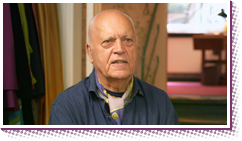 Klaus Schumann, born 1937 in Berlin Schöneberg. After being a tailor's apprentice, he moved to Switzerland between 1957 and 1961. Jobs with distinguished fashion designers from West Berlin followed. He received his master craftsman certificate in 1975 and opened his own studio. Schumann outed himself publicly alongside more than 600 other gay men from West Berlin through a 1978 cover story by German news magazine Stern, titled "We are gay". The publication caused a breach with his family. Schumann lost his long-time boyfriend to AIDS. At over 80, he still works in his studio in Berlin Wilmersdorf as a couturier for ladies fashion.
Klaus Schumann, born 1937 in Berlin Schöneberg. After being a tailor's apprentice, he moved to Switzerland between 1957 and 1961. Jobs with distinguished fashion designers from West Berlin followed. He received his master craftsman certificate in 1975 and opened his own studio. Schumann outed himself publicly alongside more than 600 other gay men from West Berlin through a 1978 cover story by German news magazine Stern, titled "We are gay". The publication caused a breach with his family. Schumann lost his long-time boyfriend to AIDS. At over 80, he still works in his studio in Berlin Wilmersdorf as a couturier for ladies fashion. 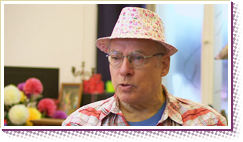 Rosa von Praunheim, born 1942 in Riga, Latvia. He grew up in Teltow-Seehof and later on, in the district of Praunheim in Frankfurt am Main. Rosa moved to Berlin in 1962. The name "Rosa" is a reference to the pink triangle that identified gay prisoners in Nazi concentration camps. His film It is not the homosexual who is perverse, but the society in which he lives is considered a beacon of the gay rights movement of the 70's. His AIDS films from the late 80's and early 90's were a catalyst for the German AIDS movement.
Rosa von Praunheim, born 1942 in Riga, Latvia. He grew up in Teltow-Seehof and later on, in the district of Praunheim in Frankfurt am Main. Rosa moved to Berlin in 1962. The name "Rosa" is a reference to the pink triangle that identified gay prisoners in Nazi concentration camps. His film It is not the homosexual who is perverse, but the society in which he lives is considered a beacon of the gay rights movement of the 70's. His AIDS films from the late 80's and early 90's were a catalyst for the German AIDS movement. 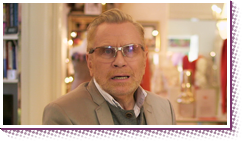 René Koch, born 1945 in Heidelberg. René came to Berlin at age 18 and worked as a dishwasher, bartender, transvestite performer, and co-owner of a food store. He began his formation as a make-up artist in 1969 and became the chief make-up artist for Charles of the Ritz in New York in 1971. He returned to Berlin in 1990 and made a name for himself as one of the city's most sought after make-up artists. Koch became actively engaged in AIDS support organizations and launched the working group "Camouflage" in 1996 to support people with skin anomalies. He also established a lipstick museum in his home in Berlin Wilmersdorf and published an autobiography titled Abgeschminkt in 2016. René continues to maintain a decades-long friendship with star hairdresser Udo Walz.
René Koch, born 1945 in Heidelberg. René came to Berlin at age 18 and worked as a dishwasher, bartender, transvestite performer, and co-owner of a food store. He began his formation as a make-up artist in 1969 and became the chief make-up artist for Charles of the Ritz in New York in 1971. He returned to Berlin in 1990 and made a name for himself as one of the city's most sought after make-up artists. Koch became actively engaged in AIDS support organizations and launched the working group "Camouflage" in 1996 to support people with skin anomalies. He also established a lipstick museum in his home in Berlin Wilmersdorf and published an autobiography titled Abgeschminkt in 2016. René continues to maintain a decades-long friendship with star hairdresser Udo Walz. 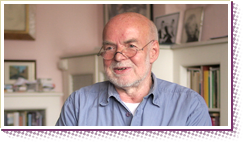 Wolfgang Theis, born 1948 in Gärtringen, in Southern Germany. He trained as a cook, then completed his military service with the German Navy. He lives in Berlin since the late '60s - much of that time in a shared flat - and is a co-founder of the HAW (Homosexual Action Group). Wolfgang then launched his career as a film critic, and in 1984, he helped create the exhibition "Eldorado - History, daily life and culture of homosexual women and men in Berlin 1850-1950" in the Berlin Museum. A year later, he co-founded the association "Friends of the Gay Museum in Berlin" and was awarded a Federal Cross of Merit in 2011 for his work for the Gay Museum. He still curates dozens of exhibitions at the museum.
Wolfgang Theis, born 1948 in Gärtringen, in Southern Germany. He trained as a cook, then completed his military service with the German Navy. He lives in Berlin since the late '60s - much of that time in a shared flat - and is a co-founder of the HAW (Homosexual Action Group). Wolfgang then launched his career as a film critic, and in 1984, he helped create the exhibition "Eldorado - History, daily life and culture of homosexual women and men in Berlin 1850-1950" in the Berlin Museum. A year later, he co-founded the association "Friends of the Gay Museum in Berlin" and was awarded a Federal Cross of Merit in 2011 for his work for the Gay Museum. He still curates dozens of exhibitions at the museum. 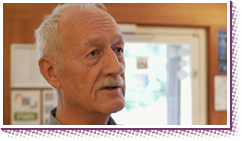 Wilfried Laule, born 1945 in Eigeltingen near Konstanz am Bodensee. He studied fine arts in Stuttgart and then Berlin, where he lives since 1970. As a founding member of the HAW, he filmed many of the group's actions and campaigns with his Super-8 camera. Wilfried taught art in several schools in Berlin and still works as a painter and photographer. His work has been published in magazines and books, and has been shown in a number of exhibitions, including two solo shows in Berlin's Gay Museum.
Wilfried Laule, born 1945 in Eigeltingen near Konstanz am Bodensee. He studied fine arts in Stuttgart and then Berlin, where he lives since 1970. As a founding member of the HAW, he filmed many of the group's actions and campaigns with his Super-8 camera. Wilfried taught art in several schools in Berlin and still works as a painter and photographer. His work has been published in magazines and books, and has been shown in a number of exhibitions, including two solo shows in Berlin's Gay Museum. Salomé, born 1954 in Karlsruhe. He came to Berlin in 1973 and was part of the drag faction of the HAW while he studied at the "Universität der Künste". As an artist, he was considered part of the "Neue Wilde" movement of young painters from Germany and Austria. His big international break arrived in 1982, when his work was shown at the documenta 7 in Kassel. From 1983, he lived and worked as a painter and performance artist in New York, and returned to Berlin Kreuzberg in 1998.
Salomé, born 1954 in Karlsruhe. He came to Berlin in 1973 and was part of the drag faction of the HAW while he studied at the "Universität der Künste". As an artist, he was considered part of the "Neue Wilde" movement of young painters from Germany and Austria. His big international break arrived in 1982, when his work was shown at the documenta 7 in Kassel. From 1983, he lived and worked as a painter and performance artist in New York, and returned to Berlin Kreuzberg in 1998. 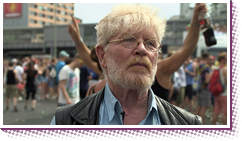 Egmont Fassbinder, born 1945 in Kippenheim. He lives in Berlin since 1965, where he moved at the end of high school in order to avoid doing his military service. Egmont studied social sciences in Heidelberg and at "Freie Universität" in Berlin. He was a member of the student parliament in the German Socialist Student Alliance (SDS) and is a co-founder and active member of the HAW. Since 1978, he heads the publishing company Verlag rosa Winkel, which publishes fiction and non-fiction books on gay related topics.
Egmont Fassbinder, born 1945 in Kippenheim. He lives in Berlin since 1965, where he moved at the end of high school in order to avoid doing his military service. Egmont studied social sciences in Heidelberg and at "Freie Universität" in Berlin. He was a member of the student parliament in the German Socialist Student Alliance (SDS) and is a co-founder and active member of the HAW. Since 1978, he heads the publishing company Verlag rosa Winkel, which publishes fiction and non-fiction books on gay related topics. 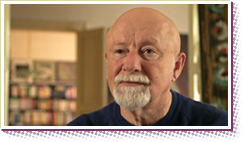 Gerhard Hoffmann, born 1946. He studied political science in Munich and moved to Berlin in 1973 with his boyfriend Reinhard von der Marwitz. Both of them continued their studies at the Freie Universität. They were active in the HAW and co-founded the magazine Schwuchtel (1975), then the café "Anderes Ufer" (1977), and finally the publishing house "Albino Verlag" (1981). In 2016, he received the Federal Cross of Merit for his many years of activism in the gay rights movement.
Gerhard Hoffmann, born 1946. He studied political science in Munich and moved to Berlin in 1973 with his boyfriend Reinhard von der Marwitz. Both of them continued their studies at the Freie Universität. They were active in the HAW and co-founded the magazine Schwuchtel (1975), then the café "Anderes Ufer" (1977), and finally the publishing house "Albino Verlag" (1981). In 2016, he received the Federal Cross of Merit for his many years of activism in the gay rights movement. Peter Hedenström, born 1948 in Lübeck. After high school, he studied German literature in Göttingen, and beginning in 1969, in Berlin. He was one of the founding members of HAW, as well as co-founder of the publishing house "Verlag rosa Winkel" (1975) and of the gay bookstore "Prinz Eisenherz" (1978), where he worked until 2003. In the mid 80's, the Prinz Eisenherz bookstore was one of Berlin's most important centers on AIDS information.
Peter Hedenström, born 1948 in Lübeck. After high school, he studied German literature in Göttingen, and beginning in 1969, in Berlin. He was one of the founding members of HAW, as well as co-founder of the publishing house "Verlag rosa Winkel" (1975) and of the gay bookstore "Prinz Eisenherz" (1978), where he worked until 2003. In the mid 80's, the Prinz Eisenherz bookstore was one of Berlin's most important centers on AIDS information. 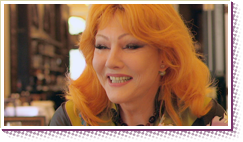 Romy Haag, born in the Netherlands. After stints in Paris and New York, she moved to Berlin and opened the nightclub Chez Romy Haag in 1974, where she performed as a drag artist. The club was extremely popular up until 1983, when it closed its doors. Romy also acted in films, had her own TV show, and released several albums as a singer. To this day, she is considered one of the most versatile queer artists in Germany. She has been a member of the board of trustees of the Berlin AIDS support organization since the late 80's.
Romy Haag, born in the Netherlands. After stints in Paris and New York, she moved to Berlin and opened the nightclub Chez Romy Haag in 1974, where she performed as a drag artist. The club was extremely popular up until 1983, when it closed its doors. Romy also acted in films, had her own TV show, and released several albums as a singer. To this day, she is considered one of the most versatile queer artists in Germany. She has been a member of the board of trustees of the Berlin AIDS support organization since the late 80's.  Bob Schneider, grew up in the same building as Ades Zabel. They first met on a bus on the way home from the nightclub Dschungel on Adenauerplatz and have been working together ever since. Like Ades, Bob also worked as projectionist at the Moviemento cinema. In the 90's, he studied editing at the film school in Potsdam Babelsberg. In the role of "Jutta", he performs as a tourist tour guide of Berlin on a comedy bus and comedy boat. He is also the creator of a variety of theatrical performances.
Bob Schneider, grew up in the same building as Ades Zabel. They first met on a bus on the way home from the nightclub Dschungel on Adenauerplatz and have been working together ever since. Like Ades, Bob also worked as projectionist at the Moviemento cinema. In the 90's, he studied editing at the film school in Potsdam Babelsberg. In the role of "Jutta", he performs as a tourist tour guide of Berlin on a comedy bus and comedy boat. He is also the creator of a variety of theatrical performances. 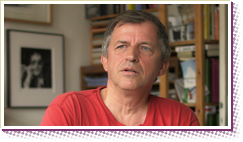 Wolfgang Müller, born 1957 in Wolfsburg. He had his coming-out in his home town and created the city's first gay group. In 1979 he participated in West Berlin's first Gay Pride march. Between 1980 and 1985, Wolfgang studied at Berlin's Hochschule der Künste and created an experimental band "Die tödliche Doris" with Nikolaus Utermöhlen. His book, Geniale Dilletanten, was published by Merve-Verlag in 1982. It became a manifesto of the young music and cultural scene of Berlin at the time. Since 1990, Wolfgang lives between Reykjavík and Berlin.
Wolfgang Müller, born 1957 in Wolfsburg. He had his coming-out in his home town and created the city's first gay group. In 1979 he participated in West Berlin's first Gay Pride march. Between 1980 and 1985, Wolfgang studied at Berlin's Hochschule der Künste and created an experimental band "Die tödliche Doris" with Nikolaus Utermöhlen. His book, Geniale Dilletanten, was published by Merve-Verlag in 1982. It became a manifesto of the young music and cultural scene of Berlin at the time. Since 1990, Wolfgang lives between Reykjavík and Berlin.  Ades Zabel, born 1963 in Berlin Haselhorst. He grew up in Charlottenburg's Paul-Hertz neighborhood in West Berlin. Ades completed an apprenticeship in the men's wear department of the famous KaDeWe department store. A big fan of Super-8 movies, he shot his first film with friends in the early 80's, titled Edith Schröder. A German housewife, which became a cult hit. He made his living as a projectionist at the Moviemento cinema in Kreuzberg. Between 1987 and 1992, he created and acted (as Edith) alongside Bob Schneider (who played Jutta) in the film trilogy Drei Drachen vom Grill, a parody of the TV trilogy Drei Damen vom Grill. Ades Zabel and Bob Schneider still perform together in the same roles.
Ades Zabel, born 1963 in Berlin Haselhorst. He grew up in Charlottenburg's Paul-Hertz neighborhood in West Berlin. Ades completed an apprenticeship in the men's wear department of the famous KaDeWe department store. A big fan of Super-8 movies, he shot his first film with friends in the early 80's, titled Edith Schröder. A German housewife, which became a cult hit. He made his living as a projectionist at the Moviemento cinema in Kreuzberg. Between 1987 and 1992, he created and acted (as Edith) alongside Bob Schneider (who played Jutta) in the film trilogy Drei Drachen vom Grill, a parody of the TV trilogy Drei Damen vom Grill. Ades Zabel and Bob Schneider still perform together in the same roles. 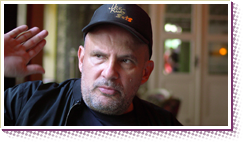 DJ Westbam, born 1965 in Münster, was a major fan of punk music as a teenager. He moved to Berlin in 1983 and began his career as a DJ in the Metropol nightclub. In 1984 he published the text What is record art, in which he describes the DJ as a musician who composes entirely new pieces from existing albums. As a producer, Westbam is considered one of the pioneers of techno music. His name is short for Westfalia Bambaataa, a reference to the famous New York hip hop DJ Afrika Bambaataa.
DJ Westbam, born 1965 in Münster, was a major fan of punk music as a teenager. He moved to Berlin in 1983 and began his career as a DJ in the Metropol nightclub. In 1984 he published the text What is record art, in which he describes the DJ as a musician who composes entirely new pieces from existing albums. As a producer, Westbam is considered one of the pioneers of techno music. His name is short for Westfalia Bambaataa, a reference to the famous New York hip hop DJ Afrika Bambaataa. 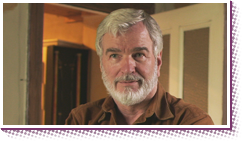 Wieland Speck, born 1951 in Freiburg im Breisgau. He lives in Berlin since 1972, where he studied German literature, Drama, and cultural anthropology at the "Freie Universität". He has been living in a men's commune ever since and only moved out in 2016. He first began making films in the 70's and directed Westler, a gay East-West love story, for the television channel ZDF in 1985. Alongside Manfred Salzgeber, he founded the lesbian-gay "Teddy film prize" in 1987, which is awarded every year at the Berlin film festival. Since 1992, he is the head programmer of the Panorama section of the Berlin Film festival.
Wieland Speck, born 1951 in Freiburg im Breisgau. He lives in Berlin since 1972, where he studied German literature, Drama, and cultural anthropology at the "Freie Universität". He has been living in a men's commune ever since and only moved out in 2016. He first began making films in the 70's and directed Westler, a gay East-West love story, for the television channel ZDF in 1985. Alongside Manfred Salzgeber, he founded the lesbian-gay "Teddy film prize" in 1987, which is awarded every year at the Berlin film festival. Since 1992, he is the head programmer of the Panorama section of the Berlin Film festival. 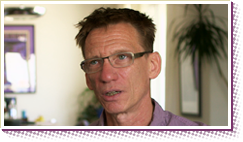 Dirk Ludigs, born 1965, grew up in the Saarland region and founded a lesbian-gay youth group in his home town in 1983. After graduating from high school, he came to Berlin and developed his own performance program in the "SchwuZ" nightclub in 1985. In 1987 he began working as a freelance journalist for the alternative radio station 100. He currently lives in the US.
Dirk Ludigs, born 1965, grew up in the Saarland region and founded a lesbian-gay youth group in his home town in 1983. After graduating from high school, he came to Berlin and developed his own performance program in the "SchwuZ" nightclub in 1985. In 1987 he began working as a freelance journalist for the alternative radio station 100. He currently lives in the US. 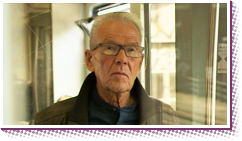 Wolfgang Winkler, born 1957 in Wolfsburg. He had his coming-out in his home town and created the city's first gay group. In 1979 he participated in West Berlin's first Gay Pride march. Between 1980 and 1985, Wolfgang studied at Berlin's Hochschule der Künste and created an experimental band "Die tödliche Doris" with Nikolaus Utermöhlen. His book, Geniale Dilletanten, was published by Merve-Verlag in 1982. It became a manifesto of the young music and cultural scene of Berlin at the time. Since 1990, Wolfgang lives between Reykjavík and Berlin.
Wolfgang Winkler, born 1957 in Wolfsburg. He had his coming-out in his home town and created the city's first gay group. In 1979 he participated in West Berlin's first Gay Pride march. Between 1980 and 1985, Wolfgang studied at Berlin's Hochschule der Künste and created an experimental band "Die tödliche Doris" with Nikolaus Utermöhlen. His book, Geniale Dilletanten, was published by Merve-Verlag in 1982. It became a manifesto of the young music and cultural scene of Berlin at the time. Since 1990, Wolfgang lives between Reykjavík and Berlin. 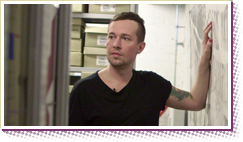 Patsy L' amour La Love, refers to herself as a professional drag queen. She studied at "Humboldt Universität" in Berlin and wrote her dissertation about the gay movement of the 70's. She calls the leading gay activists of the time her "mothers and sisters". Patsy organizes scientific and cultural events like the "Polymorphia" party in "SchwuZ" club and is active on the advisory board of Berlin's Gay Museum. In 2016, her book Self-hate & emancipation was published by Querverlag.
Patsy L' amour La Love, refers to herself as a professional drag queen. She studied at "Humboldt Universität" in Berlin and wrote her dissertation about the gay movement of the 70's. She calls the leading gay activists of the time her "mothers and sisters". Patsy organizes scientific and cultural events like the "Polymorphia" party in "SchwuZ" club and is active on the advisory board of Berlin's Gay Museum. In 2016, her book Self-hate & emancipation was published by Querverlag. 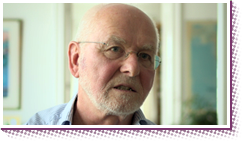 Detlef Mücke, born 1944. He grew up in Hannover, studied in Göttingen, and has been living and working as a teacher in Berlin since 1971. Detlev is a co-founder of the teacher's group in the HAW. As an activist, he worked to end occupational bans for gay teachers and homosexual discrimination in the school syllabus. He came-out publicly in front of his students in 1978 and was one of the initiators of the working group of homosexual teachers and educators in the Education and Science union.
Detlef Mücke, born 1944. He grew up in Hannover, studied in Göttingen, and has been living and working as a teacher in Berlin since 1971. Detlev is a co-founder of the teacher's group in the HAW. As an activist, he worked to end occupational bans for gay teachers and homosexual discrimination in the school syllabus. He came-out publicly in front of his students in 1978 and was one of the initiators of the working group of homosexual teachers and educators in the Education and Science union. 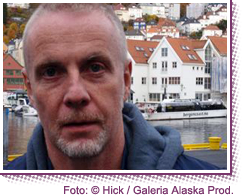 Jochen Hick, born 1960 in Darmstadt. He grew up in the Taunus region, in Munich, and in Stuttgart. From 1981-87, Jochen studied film in Bologna, Italy, and at Hamburg's "Hochschule für Bildende Künste", with professors like Helke Sander. Since graduation, he has worked as a film director, author, journalist and producer for film and television, with a special focus on socio-cultural and LGBT topics. In 1994 he created his own production company, "Galeria Alaska Productions", with which he has produced a multitude of reports and documentaries for television stations ARD, ZDF/ARTE, 3sat, and Spiegel TV. Between 2007 and 2010, Jochen was the deputy program director and editor-in chief at TIMM, the first TV channel for gay men in the German-speaking world. Hick's films were presented at more than 300 international film festivals and received a number of awards, including the advancement award by German Film Critics (1987) and the Teddy award for best documentary (2003).
Jochen Hick, born 1960 in Darmstadt. He grew up in the Taunus region, in Munich, and in Stuttgart. From 1981-87, Jochen studied film in Bologna, Italy, and at Hamburg's "Hochschule für Bildende Künste", with professors like Helke Sander. Since graduation, he has worked as a film director, author, journalist and producer for film and television, with a special focus on socio-cultural and LGBT topics. In 1994 he created his own production company, "Galeria Alaska Productions", with which he has produced a multitude of reports and documentaries for television stations ARD, ZDF/ARTE, 3sat, and Spiegel TV. Between 2007 and 2010, Jochen was the deputy program director and editor-in chief at TIMM, the first TV channel for gay men in the German-speaking world. Hick's films were presented at more than 300 international film festivals and received a number of awards, including the advancement award by German Film Critics (1987) and the Teddy award for best documentary (2003).